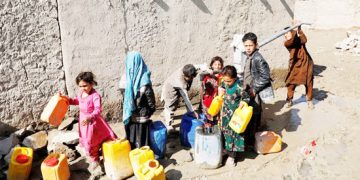Zulkafil Hassan Khan
Afghanistan was on the agenda of the 48th session of the Council of Foreign Ministers (CFM) of the Organization of Islamic Cooperation (OIC) held in Islamabad yesterday. All member countries supported the resolution on Afghanistan’s humanitarian assistance initiated by the government of Pakistan.
Since the Taliban takeover in August 2021, the Islamic fundamentalist group is struggling hard to gain international recognition of their government. This lead to Afghanistan facing grave economic crisis as well as a Humanitarian catastrophe is unfolding in Afghanistan.
Before the fall of Kabul in mid-August 2021, the Afghan macro-economy was heavily reliant upon the foreign aids and funds this had ceased following the chaotic US and NATO troop withdrawal. The international community had applied numerous economic sanctions on Afghanistan, since the Taliban takeover, the biggest and most catastrophic being the freezing of nearly 9.5 billion dollars in assets belonging to the Afghan central bank by the US, and they also stopped the shipments of cash to the nation. The chilling effect of sanctions is keeping businesses from actually engaging with the economy. Foreign banks are hesitant to engage in financial transactions with Afghan people and entities for fear of coming in conflict of sanctions. This has had dire consequences on the already crippling afghan economy.
Moreover, the International Monetary Fund had also suspended Afghanistan’s access to IMF resources which includes around $440 million in new monetary reserves, due to lack of clarity over the country’s new rulers.
Since the sanctions, Afghanistan’s currency has depreciated about 30% which has further pushed the inflation and has caused the price of food to boom. Banks have been forced to impose a limit on cash withdrawals which has resulted in businesses not being able to meet their payrolls. This has caused rampant unemployment.
Unfortunately, perpetual conflicts and crises have badly damaged the national health system of Afghanistan which now is in disarray. The afghan national health system was heavily reliant upon the foreign funds which were halted after the takeover which has resulted in afghan hospitals facing severe logistical and financial complications, ranging from shortage of medicine, essential equipment’s, protective gear and lack of money to pay the salaries of the health care personally. The pandemic has further aggravated the already dire national health system of Afghanistan. According to the World Health Organisation (WHO), the eastern region of Afghanistan in particular has experienced a sharp increase in COVID-19 cases and hospitalizations in recent weeks. Aside from the impact of the virus itself, the secondary effects of the pandemic are continuing to hit communities who had not yet recovered from the first wave. Kabul remains the most affected part of the country in terms of confirmed only two hospitals are designed for treating patients of COVID-19. This explains that due to the limited public health resources and testing capacity infection rate is constantly on the rise in the country.
Moreover, ban on lady health workers in the government departments has further deteriorated health capacity building mechanism of Afghanistan. In addition to this, psychological barriers and personal taboos of Taliban and its followers has made it more difficult to combat with this ongoing pandemic which has further worsened the ongoing humanitarian crisis.
Furthermore, due to ongoing human sage in shape of COVID-19 millions of Afghans are on the verge of facing a catastrophic famine, and their lives are at stake. Afghanistan is experiencing one of the worst droughts in 27 years, and as a result food, water and supplies are extremely scarce. 22 million people more than half of the population are facing acute food insecurity in the next three months according to the U.N. World Food Program while 3.2 million children under five could suffer acute malnutrition.
While the ongoing bitter winter is likely to further aggravate the humanitarian crisis. Snowfall and low temperatures have added to the problems faced by the vulnerable Afghan people. About 300,000 Afghan children face freezing winter conditions that could lead to illness and even death, without proper heating, clothing and food according to Save the Children.
Moreover, the policy makers of Taliban interim set-up should think beyond the theories of comparative advantage and parity ratios and pursue the holistic policies of economic growth and survival which would help them come out of the ongoing humanitarian crisis
Afghanistan should seek help from Organization of Islamic Countries (OIC) for funds in terms of humanitarian assistance, relief aids, and pledges for budgetary support to advert economic crisis in the country because the West is not in the political compulsion and strategic comprises to help Taliban.
Similarly, Afghanistan is also member of China’s One Belt & One Road Initiative (BRI) project which connects South Asia with Central Asia and beyond. Taliban should convince Chinese counterpart to provide necessary economic and financial assistance to limit the looming economic crisis in the country.
Most recently, the US has unfrozen funds of$7.5 billion but only half of the amount announced to be delivered to Afghanistan. In this connection, all efforts should be initiated for its early release to save common people from hunger, starvation and poverty in the country.
Furthermore, diversified but integrated steps may be initiated to give some sagacity and cushion for further improvement of the dire national health care system of Afghanistan.
Islamic Relief Funds may be sought to give some essential support, services, medications, equipment and human capital to ailing system of health in Afghanistan. In this regard the upcoming OIC meeting could play a crucial role.
Chinese global drive of vaccine and health supplies may be pursued for supporting the health system of Afghanistan. Special efforts should also be made to seek help from international health organization WHO.
To conclude, Afghanistan is now passing through difficult time due to which even its social fabrics, political stability and economic sustainability is at high risk. In this connection, many sad incidents of selling of human kidneys are reported in the international media which reflect urgent need of funds and aid.




